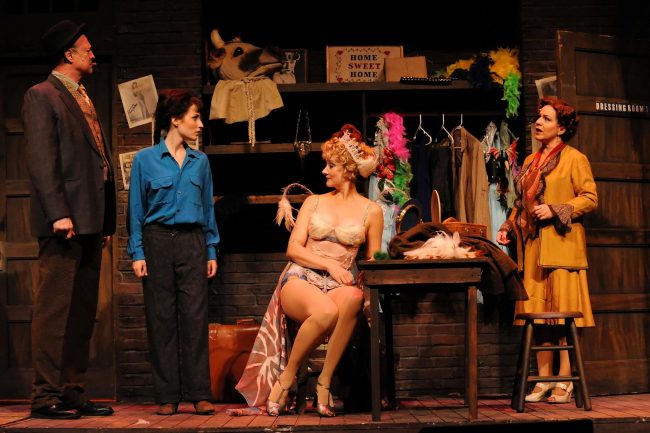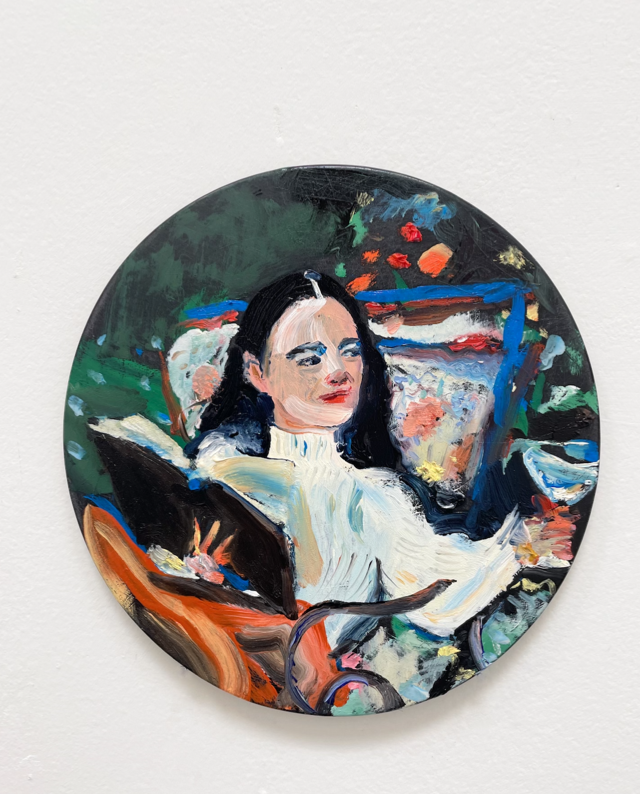
From left to right (Courtesy of Michael C. Foster)
She had a dream, and she dreamed it for them.
The lights dim and the phenomenal 39 piece orchestra breaks into a spectacular overture.
Lyric Stage’s “Gypsy” is about to begin, and the music can barely drown out the buzz of the audience.
“Gypsy,” The Great American Musical, with book by Arthur Laurents, music by Jule Styne and Lyrics by Stephen Sondheim, is arguably one of the best-known and most well written musicals of the century.
“Gypsy” tells the story of the ultimate stage mother, Rose, and how she desperately tries to balance her family with the dreams or show business she has for them.
“Gypsy” opened in 1959 on Broadway with Ethel Merman as Rose and was adapted for film in 1993 with Bette Midler as Rose.
It was most recently revived in 2008 with Patti LuPone taking up the mink.
Rose, played by Sue Mathys, is an incredibly difficult role to take on, as Rose is both a ruthlessly determined agent, forcing her daughters into the spotlight, as well as a deeply caring and loving mother.
At first, it seems Mathys holds back, letting opportunities to really let Rose’s personality shine slide into simple gag moments, (particularly in the song, “You’ll Never Get Away From Me”).
I craved more Rose.
When Rose has to undergo significant character development at the end of act one, however, Mathys’s performance brings the entire theater to a standstill as you see Rose’s heartbreak race across Mathys’s face.
From then on out, Mathys blends the mad stage mother with the sheltering “mama.”
Mathys’s voice is stunning throughout but it really takes off when Rose emerges.
Rose may be the star, but the story is nothing without her daughters, June and Louise, and her agent/companion, Herbie. played by Sonny Franks.
The story begins with June and Louise as children, played by Kristin Wright and Taylor Hennings, respectively, and each hold their own with their adult counterparts.
Rose always forces June to the front of the acts and puts Lousie in pants to sing with the chorus, and Wright masters her Baby June routine flawlessly.
The story jumps ahead about seven or eight years and Baby June, now “Dainty June,” is played by Ashton Smalling, while Louise, played by Mary McElree, is still a boy in the chorus.
Smalling and McElree have terrific chemistry on stage and play off one another very well to really develop their
characters.
McElree deftly resists the urge to show us everything until later in the show, keeping her stage presence and her character’s confidence in check in accordance with Louise’s lack of confidence and doubting insecurities, though she could have had a little more fun with the character.
Franks adds a real charm to the otherwise background character of Herbie, knowing just when to show his colors in defending and later losing Rose.
It would be a crime to speak of this production without mentioning the aging strippers, Tesse Tura, played by Caitlin Carter, Mazeppa, played by Sara Shelby-Martin, and Electra, played by Shannon McGrann.
After hitting the roughest of rough patches, Rose, Louise, and Herbie are forced to find work in a low-class Burlesque House, and these three faded gems cause a riot with “You Gotta Get a Gimmick.”
The dancing cow bit is extremely well done, with dance captain and SMU ’11 grad Katharine Gentsch bringing up the rear, and the eleven o’clock number, “Roses Turn,” bathes the audience in Rose’s passionate plea for stardom.
Mathys earns her standing ovation with the simplest of turns just before the final curtain, begging one last glimmer of the spotlight with a split second look to the audience.
Not a cue, instrument or spotlight was out of place, though cast members were sometimes visible in the wings.
The lights were a point of interest; while the colors sometimes oversaturated the stage, subtle directions like leaving the spotlight on Rose for a litter longer after a
blackout lent a technical angle to Rose’s character.
The passing from the Baby June years to the Dainty June years with a strobe light was excellently executed, but the journey of Rose, June and Louise collecting their travelling vaudeville troupe in a stationary car did not work as well when not all actors acted like they were in a car.
The 39-piece orchestra really cannot be understated, as it breathes so much life into the score and fills the entire theater with such a rich tone.
There is little below par to say about Lyric Stage’s production of “Gypsy.” Rose may not have truly bloomed until later in the show, but it was a brilliant bloom when we saw it.
June and Louise had terrific onstage chemistry, though Louise never really seemed to let herself go, Herbie managed to be charming during his relatively small stage time, and the little touches such as the strippers and the dancing cow elevated a great show to an excellent show.
“Gypsy” runs at Lyric Stage from Sept. 9 to Sept. 18.
On Thursday, the Lyric Stage will be offering $10 tickets for SMU students with a valid student I.D.
The show starts at 8 p.m.











